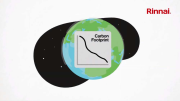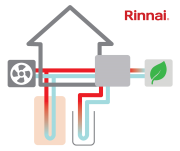Sign up to the Rinnai newsletter today and track UK government policy updates – https://www.rinnai-uk.co.uk/contact-us/newsletter-sign
All present energy policy is firmly centered on reducing fossil fuels and increasing renewables as well as the effects these two fuels produce. Nothing is mentioned of an increase on future demand for commercial and domestic cooling and air conditioning technologies that will influence energy demand and NetZero aims.
Considering rising global temperatures and an increase in UK national humidity levels it would make sense to examine available information that provides some insight into what could happen when domestic and commercial cooling & air conditioning units become a property necessity.
A recent article in the Independent newspaper quoted a survey held by insurers Direct Line questioning London estate agents on air conditioning demand.
“Some 95% of estate agents are seeing an increase in demand for homes with air conditioning as temperatures rise, a survey has suggested. More than four in five agents (88%) also reported a rise in homes coming to the market with built-in air conditioning,” said the report.
This survey suggests that air conditioning is at the very least a sought-after luxury, if not a ‘must have’ appliance such as a washing machine or microwave. A sharp rise in future UK cooling & air conditioning unit demand is expected and the extra power they require for operation passes on strain to the electrical grid.
Last June when temperatures exceeded 30°C (86°F) the national grid had to utilize coal to provide enough power created by air conditioning usage. This was the first time in 48 days the UK grid had to use fossil fuels.

The Statista webpage has published a number of projections solely focused on the UK air conditioning market. The UK air cooling market is expected to experience an annual growth rate of 3.78% between 2024-2029. Additionally, there is an anticipated volume growth of 2.9% in 2025. There were also record UK sales of air cooling in 2021 at 213,000 confirmed purchases. 2021 is the last available year for definitively confirmed statistics in air cooling sales.
International usage of air-cooling units is also expanding due to sharp rises in regional temperature. Southern France, Italy and Spain now regularly experience plus 40°C heat throughout their summer months. All mentioned countries have had to place into effect a limit on air cooling temperatures so not to place too much strain on the electrical grid.
According to Idealista, a European real estate company, 41% of Spanish housing stock is equipped with air cooling technology. The Spanish air conditioner market is expected grow an annual rate of 4.25% from 2024 to 2029 and an anticipated volume growth of 3.6% in 2025.
In 2022 Spain had to introduce measures that ensured a reduction of energy usage following the Ukraine invasion and successive heat waves that have been attributed to global warming. Spanish authorities maintain legitimate concerns that an increase of electrical demand from air cooling technology could potentially lead to grid malfunctions.
Italy has experienced grid difficulties that amount to periodic blackouts specifically in the business capital Milan during July of this year – 2024. A spike in air cooling technology used to negate severe heat is thought to be a major contributing factor towards these electrical grid shutdowns due to exceeding grid capacity.
Growth in Italian air cooling is projected to increase sharply in the coming years due to excessive heat caused by rising global temperatures. An annual growth rate of 6.96% from 2024 to 2029 is expected as is volume growth of 6.9% in 2025 of Italian purchases of air-cooling technology.
France is another country affected by a rise in uncomfortable summer season temperatures. French domiciles and commercial properties are resorting to purchasing air cooling technology.
French electricity operator RTE has reportedly decided to refrain from exporting end-product electricity. RTE aims to protect the grid from increased demand attributed to air conditioning technology usage. Italy relies on French electrical imports to meet demand and could potentially feel ramifications due to the heat and air-cooling demand in France and in Italy.
French purchases of air conditioning technology are projected to increase over the coming years, with a domestic market annual growth rate of 8.45% between 2024 and 2029 and volume growth of 8.5% in 2025.
Separate national electric grids from across notable economies in Europe are struggling to provide energy demand that satisfies domestic and commercial air-cooling requirements during elevated temperatures. UK, European and international growth in air conditioning units is expected to rise in the coming years with electrical grids requiring updating and maintenance in order to deal with added demand.
UK, European, and global NetZero objectives will be impacted by an expansion in air-cooling technology usage due to the added pressure they impose on electrical grids. In a global movement towards electrification supplied by renewables, national infrastructure that transports electrical energy requires updating costing billions in finances and many, many hours of intricate labour.
It could be argued that grid complications will undoubtedly become more prevalent whilst rising global temperatures cause customers to seek air cooling solutions for their commercial and domestic properties.
Rinnai is determined to keep all customers informed of any changes relating to policy amendments and nuances that affect customer energy options and choice.
Sign up to the Rinnai newsletter today and track UK government policy updates – https://www.rinnai-uk.co.uk/contact-us/newsletter-sign